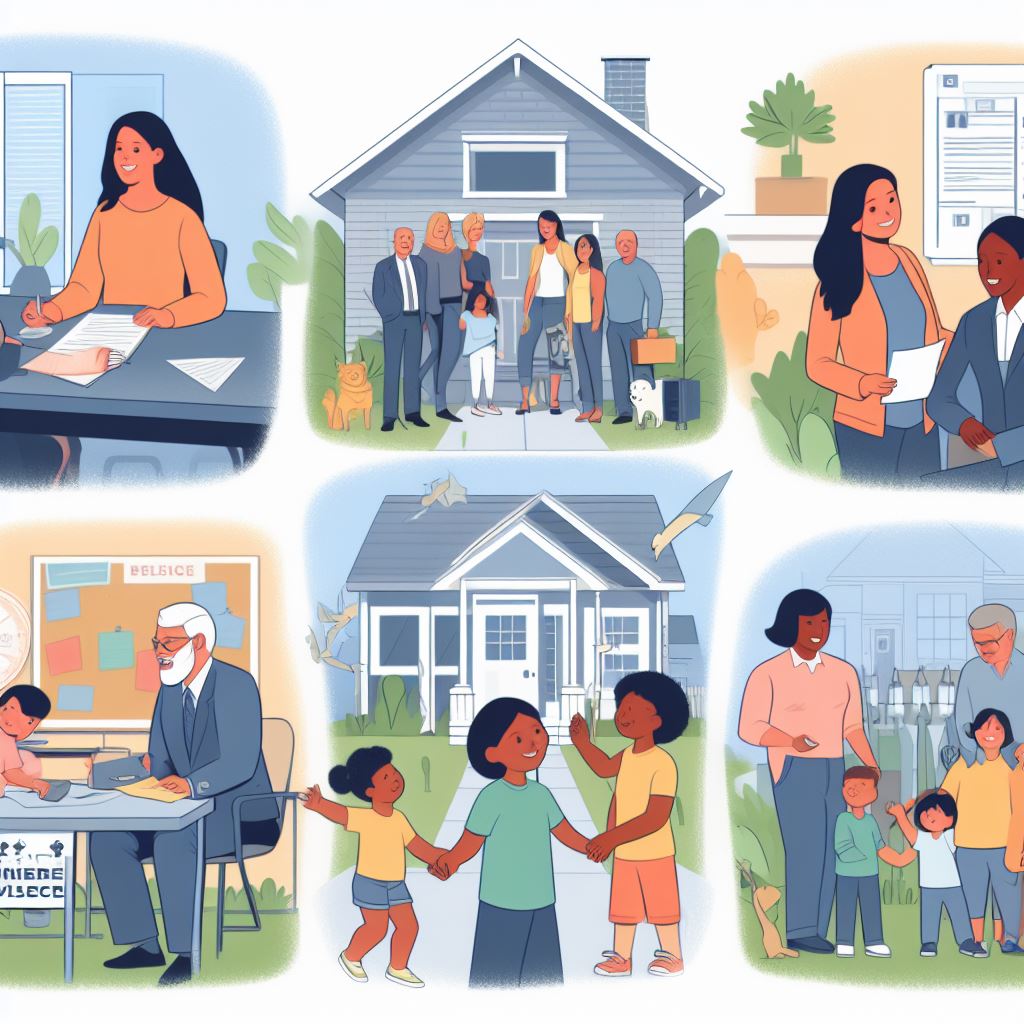Five Key Roles Public Housing Agencies Play in Subsidized Housing

Are you aware of the essential roles that public housing agencies play in subsidized housing?
Get ready to dive into the world of affordable housing advocacy, program administration and compliance, tenant support and services, property management and maintenance, and community development and engagement.
In this article, we will unravel the mysteries behind these five key roles, shedding light on the crucial work done by public housing agencies to ensure safe and affordable housing for all.
Prepare to be informed and enlightened!
Key Takeaways
- Affordable housing advocacy and support is crucial for creating equitable communities.
- Public housing agencies play a vital role in program administration and compliance to ensure subsidized housing programs run smoothly.
- Tenant support and services provided by public housing agencies help improve the quality of life and self-sufficiency of tenants.
- Public housing agencies actively engage in community development and engagement to address housing needs and contribute to the overall well-being of the communities they serve.
Affordable Housing Advocacy
You can actively engage in affordable housing advocacy by working with and supporting public housing agencies. Public housing agencies play a crucial role in advocating for affordable housing options in communities across the country. They work tirelessly to ensure that low-income individuals and families have access to safe, decent, and affordable housing. By collaborating with these agencies, you can contribute to their efforts and make a difference in your community.
One way to support public housing agencies is by volunteering your time and skills. Many agencies rely on volunteers to assist with various tasks, such as organizing community events, conducting outreach programs, or providing administrative support. By offering your time, you can help these agencies reach more people in need and raise awareness about the importance of affordable housing.
In addition to volunteering, you can also support public housing agencies through financial contributions. These agencies often rely on funding from grants, donations, and other sources to carry out their programs and services. By making a financial contribution, you can help ensure that these agencies have the resources they need to continue their advocacy efforts and provide affordable housing options to those who need it most.
By actively engaging in affordable housing advocacy and supporting public housing agencies, you can contribute to the ongoing efforts to address the affordable housing crisis. Your involvement can make a significant impact in your community and help create a more equitable and inclusive society.
Transitioning into the subsequent section about ‘program administration and compliance’, it’s important to understand the key role that public housing agencies play in ensuring program effectiveness and compliance with regulations.
Program Administration and Compliance
Public housing agencies play a vital role in ensuring the effective administration and compliance of subsidized housing programs. These agencies are responsible for managing and overseeing the day-to-day operations of the programs, ensuring that they’re implemented in accordance with federal, state, and local regulations.
Program administration involves a range of tasks, including determining eligibility criteria, processing applications, and assigning housing units to eligible individuals and families. Housing agencies are also responsible for conducting annual recertifications to verify continued eligibility and to adjust rental assistance based on changes in income or household composition. They must also maintain accurate records and reporting systems to track program participation and outcomes.
Compliance is another critical aspect of program administration. Public housing agencies must ensure that landlords and tenants comply with the terms and conditions of the subsidized housing program. This includes ensuring that rental units meet quality standards and that rent payments are made on time. Agencies must conduct regular inspections of units to ensure compliance and take appropriate action if violations are identified.
In addition to these administrative and compliance responsibilities, housing agencies also play a crucial role in providing information and guidance to program participants. They’re responsible for explaining program rules and requirements, addressing participant inquiries and concerns, and providing referrals to supportive services.
Tenant Support and Services
Tenant support and services are essential components of the role that public housing agencies play in subsidized housing, ensuring that individuals and families receive the assistance and resources they need to thrive in their homes. These support services go beyond simply providing a roof over someone’s head; they aim to create a stable and supportive environment for tenants.
Public housing agencies offer a range of services to meet the diverse needs of their tenants. These services can include financial literacy programs, job training and placement assistance, mental health counseling, and educational resources. By providing these services, public housing agencies help tenants build the skills and knowledge necessary to improve their quality of life and achieve self-sufficiency.
To illustrate the breadth of tenant support and services offered by public housing agencies, I have created the following table:
| Support Service | Description |
|---|---|
| Financial Literacy | Workshops and resources to educate tenants on budgeting, credit management, and other financial skills. |
| Job Training | Programs that provide tenants with the necessary skills and certifications to secure employment opportunities. |
| Mental Health Support | Counseling services and referrals to help tenants address and manage mental health issues. |
| Educational Resources | Access to tutoring, after-school programs, and scholarships to support academic success for tenants of all ages. |
These services play a critical role in helping tenants overcome barriers and achieve stability, ultimately improving their overall well-being. Public housing agencies understand the importance of supporting their tenants holistically and are committed to providing the necessary resources to foster success and self-sufficiency.
Property Management and Maintenance
Effective property management and maintenance are crucial aspects of ensuring the upkeep and functionality of subsidized housing. Public housing agencies have a key role in overseeing the day-to-day operations and maintenance of the properties they manage. They’re responsible for ensuring that the units are in good condition, addressing any repair issues promptly, and maintaining a safe and clean living environment for residents.
Property management involves a range of tasks, including lease enforcement, rent collection, and addressing tenant concerns. Public housing agencies must have effective systems in place to manage tenant turnover, ensure compliance with housing regulations, and handle any disputes or conflicts that may arise. By efficiently managing these aspects, agencies can maintain the stability and integrity of the housing units.
Maintenance is another critical aspect of property management. Public housing agencies must have skilled maintenance staff or contractors who can address repairs and maintenance issues in a timely manner. This ensures that the units remain in good condition and that residents have a comfortable living environment. Regular inspections and preventative maintenance programs are also essential to identify and address any potential issues before they become major problems.
In conclusion, effective property management and maintenance are essential for the proper functioning of subsidized housing. Public housing agencies play a vital role in ensuring that the properties are well-maintained and that residents have a safe and comfortable place to live. By fulfilling these responsibilities, agencies can contribute to the overall success and well-being of the communities they serve.
This lays the foundation for the subsequent section on community development and engagement, which further highlights the importance of public housing agencies in creating thriving communities.
Community Development and Engagement
By fostering community development and engagement, housing agencies contribute to the overall well-being and success of the residents they serve. Through various initiatives and programs, these agencies play a crucial role in creating a sense of belonging and enhancing the quality of life for individuals and families in subsidized housing.
- Community Events: Housing agencies organize and facilitate community events such as block parties, holiday celebrations, and cultural festivals. These events bring residents together, fostering a sense of unity and promoting social interaction.
- Educational Workshops: Agencies provide educational workshops on topics such as financial literacy, job readiness, and health and wellness. These workshops equip residents with valuable skills and knowledge, empowering them to make informed decisions and improve their overall well-being.
- Community Gardens: Many housing agencies establish community gardens where residents can grow their own fresh produce. These gardens not only promote healthy eating habits but also provide a space for residents to connect with nature and each other.
- Volunteer Opportunities: Housing agencies collaborate with local organizations to offer volunteer opportunities for residents. This allows residents to actively contribute to their community, fostering a sense of pride and belonging.
- Neighborhood Revitalization: Agencies work with residents and other stakeholders to revitalize neighborhoods through initiatives such as affordable housing development, infrastructure improvements, and neighborhood beautification projects. These efforts not only enhance the physical environment but also improve the overall quality of life for residents.
Through their commitment to community development and engagement, housing agencies create a supportive and inclusive environment where residents can thrive. By prioritizing the well-being and success of their residents, these agencies play a vital role in building strong and resilient communities.
Frequently Asked Questions
What Are the Main Challenges Faced by Public Housing Agencies in Advocating for Affordable Housing?
The main challenges faced by public housing agencies in advocating for affordable housing include limited funding, bureaucratic processes, and opposition from community members. Despite these obstacles, agencies strive to provide safe and affordable housing for all.
How Do Public Housing Agencies Ensure Program Compliance and Prevent Fraud?
To ensure program compliance and prevent fraud, public housing agencies conduct regular audits, implement strict eligibility criteria, and enforce penalties for non-compliance. They also collaborate with law enforcement agencies and use technology to detect and prevent fraudulent activities.
What Types of Support and Services Do Public Housing Agencies Provide to Tenants?
Public housing agencies provide various types of support and services to tenants. These include assistance with finding affordable housing, financial counseling, social services referrals, and maintenance and repair assistance.
How Do Public Housing Agencies Ensure That Properties Are Well-Managed and Maintained?
Public housing agencies ensure well-managed and maintained properties by implementing policies and procedures, conducting regular inspections, and addressing maintenance issues promptly. They prioritize tenant safety and comfort, fostering a positive living environment.
What Strategies Do Public Housing Agencies Use to Engage With the Community and Promote Community Development?
To engage with the community and promote development, public housing agencies use strategies like hosting events, partnering with local organizations, and providing resources for education and employment. These efforts aim to create a thriving and inclusive community.



